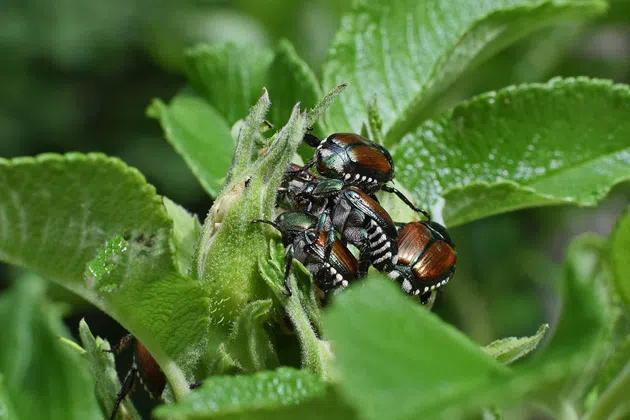
By Cole Lauterbach/Illinois Radio Network
SPRINGFIELD – Japanese beetles that survived the mild winter and spring are reportedly eating their way through fields in Central and Western Illinois.
Although reports of damage are mainly to soy and corn crops, all farmers should be on alert because the green and copper-colored insects are not picky eaters.
Dennis Bowman, educator for commercial agriculture at the University of Illinois Extension, said the beetles like to eat grapes and corn silk, but also have been known to decimate weeds in soybean fields.
Some fields in Tazewell County and the village of Roseville in Warren County have seen larger populations of Japanese beetles this year.
Mild temperatures in winter and spring can lead to high survival rates for the insect, and Bowman said the beetles can feed in very large numbers.
“They are also very social,” Bowman said. “Once they start feeding, they release a pheromone that says there’s good food here, and all the neighbors in the area will come over to wherever they are.”
Bowman said the beetles tend to eat along the edges of fields.
Corn farmers should monitor whether the beetles are clipping off corn silks faster than the crop is being pollinated. The insects interfere with corn yields by disturbing pollination, Bowman said.
“If there are lots of beetles, and they’re keeping the silks clipped off within a half inch of the end of the ear, then we probably need to be thinking about treating part of the fields,” Bowman said.
Bowman said it takes a tremendous amount of defoliation to interfere with soybean yield, as a few holes in the plant’s leaves will not be a problem.
“If the soybeans are still catching all the sunlight, and it’s not hitting the ground, the soybeans are probably not suffering much in the way of yield loss,” Bowman said.
Bowman said scouting is important when trying to determine whether to spray insecticides on farm fields.
“These beetles are pretty mobile, and they go wherever there is food,” he said. “They do like to cluster up. They may not be infecting an entire field.”




